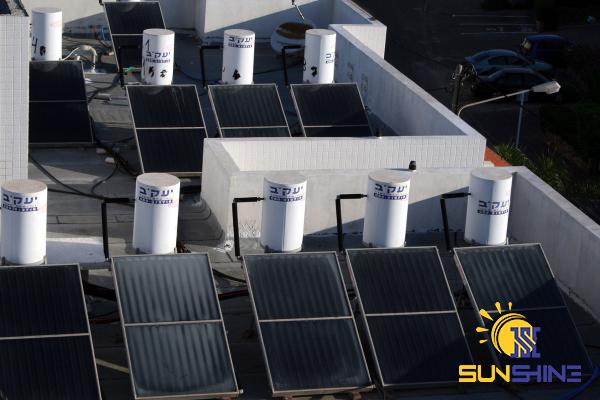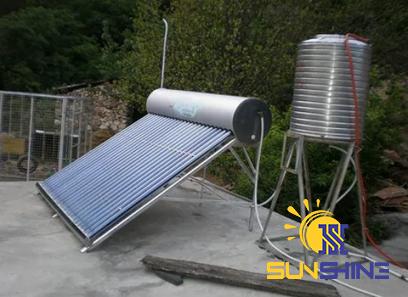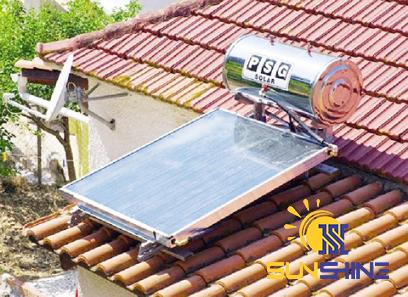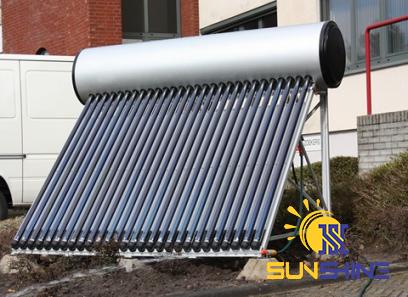Solar water heaters are becoming increasingly popular in India as a clean and sustainable solution for meeting the country’s rising demand for hot water. In a country blessed with abundant sunlight, solar water heaters offer numerous benefits, including cost savings, reduced carbon emissions and increased energy independence. A solar water heater works by capturing sunlight and converting it into heat energy to warm water. It consists of a solar collector, a storage tank, and a circulation system. The solar collector, usually mounted on the roof, absorbs sunlight and transfers the heat to a fluid, which is then pumped into the storage tank. The heated water in the tank can be used for various purposes, such as bathing, washing dishes, or even space heating. India, being a tropical country with a high solar irradiation, is ideally suited for the adoption of solar water heaters. The Ministry of New and Renewable Energy (MNRE) in India has been actively promoting the use of solar energy, including solar water heaters, through various policies and incentives. The Jawaharlal Nehru National Solar Mission (JNNSM) launched in 2010 aims to achieve 20 million square meters of solar thermal collector area by 2022. This mission has helped facilitate the widespread adoption of solar water heaters across the country. One of the key advantages of solar water heaters in India is the cost savings they offer.
Solar water
 Traditional water heating methods, such as electric geysers or gas heaters, can be expensive to operate, especially considering the rising prices of electricity and fossil fuels. In contrast, solar water heaters utilize free and abundant solar energy, significantly reducing the monthly utility bills for households and businesses. The initial investment in a solar water heater might be higher than conventional water heating systems, but the long-term savings make it a cost-effective choice. Solar water heaters also contribute to reducing carbon emissions and mitigating climate change. Traditional water heating methods rely heavily on fossil fuels, which release greenhouse gases when burned. By switching to solar water heaters, households and businesses can significantly reduce their carbon footprint and make a positive environmental impact. India, being one of the largest greenhouse gas emitters globally, can benefit from a widespread adoption of solar water heaters in achieving its climate goals. Another significant advantage of solar water heaters is their role in increasing energy independence. Solar energy is a domestic resource that is abundantly available in India.
Traditional water heating methods, such as electric geysers or gas heaters, can be expensive to operate, especially considering the rising prices of electricity and fossil fuels. In contrast, solar water heaters utilize free and abundant solar energy, significantly reducing the monthly utility bills for households and businesses. The initial investment in a solar water heater might be higher than conventional water heating systems, but the long-term savings make it a cost-effective choice. Solar water heaters also contribute to reducing carbon emissions and mitigating climate change. Traditional water heating methods rely heavily on fossil fuels, which release greenhouse gases when burned. By switching to solar water heaters, households and businesses can significantly reduce their carbon footprint and make a positive environmental impact. India, being one of the largest greenhouse gas emitters globally, can benefit from a widespread adoption of solar water heaters in achieving its climate goals. Another significant advantage of solar water heaters is their role in increasing energy independence. Solar energy is a domestic resource that is abundantly available in India.
Specifications of solar water
 By harnessing solar power for water heating, the country can reduce its dependence on imported fossil fuels, which are subject to price fluctuations and geopolitical tensions. Solar water heaters can provide a reliable and stable source of hot water without relying on external factors, ensuring a continuous supply of clean energy. In terms of usage, solar water heaters are versatile and can be applied in various settings, including residential, commercial, and industrial sectors. In residential buildings, solar water heaters can meet the hot water needs of households throughout the year. In commercial settings, such as hotels, hospitals, and educational institutions, solar water heaters can provide a sustainable solution for large-scale hot water requirements. Industries, too, can benefit from solar water heaters by using them for process heat or pre-heating purposes, thereby reducing their energy consumption and operating costs. While solar water heaters offer numerous benefits, there are also some challenges associated with their adoption in India. One of the major obstacles is the higher upfront cost of installing a solar water heater compared to conventional water heating systems. The initial investment can be a deterrent for many households with limited financial resources. However, various government schemes, subsidies, and financing options are available to make solar water heaters more affordable and accessible to all. Another challenge is the requirement of adequate space for installing the solar collectors. Rooftop space is often limited, especially in urban areas with high-rise buildings. However, innovative designs and compact systems are being developed to address this issue and make solar water heaters more suitable for urban environments.
By harnessing solar power for water heating, the country can reduce its dependence on imported fossil fuels, which are subject to price fluctuations and geopolitical tensions. Solar water heaters can provide a reliable and stable source of hot water without relying on external factors, ensuring a continuous supply of clean energy. In terms of usage, solar water heaters are versatile and can be applied in various settings, including residential, commercial, and industrial sectors. In residential buildings, solar water heaters can meet the hot water needs of households throughout the year. In commercial settings, such as hotels, hospitals, and educational institutions, solar water heaters can provide a sustainable solution for large-scale hot water requirements. Industries, too, can benefit from solar water heaters by using them for process heat or pre-heating purposes, thereby reducing their energy consumption and operating costs. While solar water heaters offer numerous benefits, there are also some challenges associated with their adoption in India. One of the major obstacles is the higher upfront cost of installing a solar water heater compared to conventional water heating systems. The initial investment can be a deterrent for many households with limited financial resources. However, various government schemes, subsidies, and financing options are available to make solar water heaters more affordable and accessible to all. Another challenge is the requirement of adequate space for installing the solar collectors. Rooftop space is often limited, especially in urban areas with high-rise buildings. However, innovative designs and compact systems are being developed to address this issue and make solar water heaters more suitable for urban environments.
buy Solar water
 Maintenance and servicing of solar water heaters are also essential to ensure their optimal performance and longevity. Periodic cleaning of the solar collectors, checking the circulation system, and inspecting the storage tank are crucial for the efficient operation of the system. Regular maintenance can help identify and address any issues early on, preventing costly repairs or replacements. To promote the adoption of solar water heaters, awareness campaigns and educational programs are vital. Many people in India are unaware of the benefits and potential savings that solar water heaters offer. Therefore, efforts should be made to educate the public about the technology, its advantages, and the available government incentives. This can help dispel any misconceptions and encourage more individuals and businesses to switch to solar water heaters. In conclusion, solar water heaters have tremendous potential in India to meet the country’s growing demand for hot water in a sustainable and cost-effective manner. With favorable policies and incentives in place, solar water heaters can help reduce carbon emissions, increase energy independence, and improve the affordability of hot water for households and businesses. Continued efforts to raise awareness, improve affordability, and address technical challenges can further accelerate the widespread adoption of solar water heaters in India.
Maintenance and servicing of solar water heaters are also essential to ensure their optimal performance and longevity. Periodic cleaning of the solar collectors, checking the circulation system, and inspecting the storage tank are crucial for the efficient operation of the system. Regular maintenance can help identify and address any issues early on, preventing costly repairs or replacements. To promote the adoption of solar water heaters, awareness campaigns and educational programs are vital. Many people in India are unaware of the benefits and potential savings that solar water heaters offer. Therefore, efforts should be made to educate the public about the technology, its advantages, and the available government incentives. This can help dispel any misconceptions and encourage more individuals and businesses to switch to solar water heaters. In conclusion, solar water heaters have tremendous potential in India to meet the country’s growing demand for hot water in a sustainable and cost-effective manner. With favorable policies and incentives in place, solar water heaters can help reduce carbon emissions, increase energy independence, and improve the affordability of hot water for households and businesses. Continued efforts to raise awareness, improve affordability, and address technical challenges can further accelerate the widespread adoption of solar water heaters in India.










Your comment submitted.